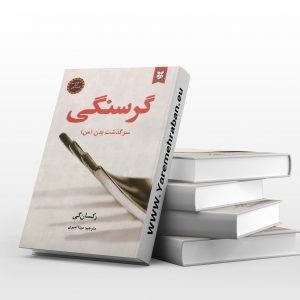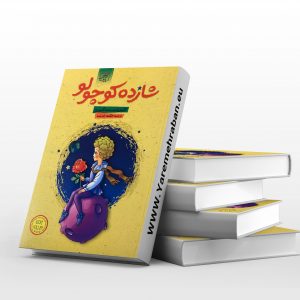Description
Don Quixote is one of the most beautiful, great and great stories in the world and is considered by many to be the best Spanish novel. Reading this work by Cervantes, with the brilliant and astonishing translation of Mohammad Ghazi, will remain in your mind forever. Mohammad Ghazi translated this novel from French to Persian.
Don Quixote has two volumes, the first of which was first published in 1605 and has been extremely well received in Spain and Portugal from the very beginning. The second volume of Don Quixote was published ten years later, in 1615.
The painting you see on the cover of Don Quixote’s novel is the work of French painter Nouveau de Gaulle. Pablo Picasso also painted a painting of Don Quixote and his nobleman at the beginning of the book.
An excerpt from Don Quixote’s novel states:
Perhaps no book has been so loved by so many different nations as Don Quixote.
There are many books that belong to only one people and nation and do not go beyond the borders of one country; There are many others who have singers among other nations, but only the favorite of intellectuals or ordinary people or the privileged classes.
But Don Quixote has broken down all the geographical, racial, social and class barriers and made his name associated with the world and humanity.
It is enough that this novel has been published more than a thousand times in more than thirty different languages since the beginning of the seventeenth century and has been translated and reprinted fifty times in the Soviet Union alone since 1917, each time in 900,000 copies and in fourteen languages.
Synopsis has been made of this amazing masterpiece, plays have been made, and it has often been portrayed as ballet, opera, and film, and Don Quixote is still one of the most widely read books, despite the changes that have taken place in literary taste over the past few centuries.
Don Quixote is a middle-aged gentleman who reads books and stories of heroism day and night, and there is not a single book in this field that he has not read. He knows all the heroes and knights and knows the adventures that have befallen them.
Now, at a time when heroism is no longer thriving, Don Quixote, under the influence of his books and mental imaginations, decides to wear armor, put on his hat, wield a sword, and ride a horse weaker than himself to establish justice in the world and protect the oppressed. Defend against tyrannical rulers.
Daydreaming is the strength and daily food of Don Quixote. He considers the ruined caravanserai to be a stronghold, the harmless passers-by to be the wicked sorcerer, the maids and the robbers to be princesses, and the windmills to be a mythical court; Smoked fish in his taste gives the taste of salmon and then ewes and lambs in his ear gives the sound of horses chirping and the sound of trumpets and the sound of drums.
Don Quixote then chooses a more nobleman and promises him wealth and rule over an island. Sancopanza – Elder Don Quixote – does not have an active imagination like him and sees everything as it is. Sanko always tells the truth and never denies it. Unlike Don Quixote – who, if beaten to death, tries to convince himself that he is not in pain – Sanko sees and feels everything as it is without compliments and self-deception.
Sanko has not read a book about heroism and is illiterate, but as we have mentioned, he is realistic and many critics believe that Don Quixote is his main problem.
Sancopanza speaks sweetly. Sometimes he highly respects and respects Don Quixote, and sometimes he severely suppresses his imagination. He also always uses proverbs in his speech. Proverbs that are often mispronounced and make Don Quixote angry.
In a part of the novel we read:
Don Quixote went on to say, “Sanko, you must also try not to use all the proverbs that you season with words.”
Of course, it is true that proverbs are words, but your heart, according to the habit, you use them so irrelevantly and unnecessarily that it is more like nonsense and delusion.
Sanko said: Wow! Lord, only God can cure this pain, because I know it as a book of proverbs, and when I want to speak, several of them come out of my mouth at once, and it is as if they are pushing each other to come out sooner, and each I say that they came earlier, even if it is useless and disproportionate.
Don Quixote chooses an unseen mistress for himself and thus begins his adventure. Wherever he goes and whoever he reaches, he gives orders to stop and wants to be informed of the situation and establish justice.
In a part of the book, Don Quixote describes his mistress as follows:
Her name is “Dulsineh” and her hometown is Tobuzo, one of the villages of Manesh, and her title is at least a princess, because she is my queen and my lover.
Her beauty is superhuman because in her sweetness all the imaginative qualities that poets attribute to their loved ones have been realized and accumulated: her hair is a rope woven of golden thread, her forehead stays in the garden of Eram, her eyebrows like a rainbow, her eyes like a sun, her cheeks Its lips are red like coral, its teeth are like pearls, its neck is like white stone, its chest is like marble, its arms are like ivory and its whiteness is like snow.
As for the part of him that hides chastity from the eyes of his men, I think it should be such that with the most careful examination, only its price can be determined, but no doubt can be found for it.
One of the most famous adventures of this novel is Don Quixote’s attack on a windmill.
In the eighth chapter of the first volume of the book, we read:
At that time, they saw thirty to forty windmills in that plain, and as soon as Don Quixote caught their eye, he said to his elder, “Luck will do things better than we wished.” Look, Sanko, there are all thirty demons in front of us right now, and I intend to fight them all and make them understand, no matter who they are.
We will become richer little by little with the booty that we will seize from them, because this is a war of truth, and cleansing the world from the filth of the existence of this filthy lineage will be a great act of worship before God Almighty.
Sancopanza asked: Which demon? His master replied: The ones you see there with their long arms, because among them are madmen whose arms are about two miles long. Sanko replied, “Be careful, my lord. What we see from afar is not madness, but windmills, and what we think is the arm of Asia, which, when moved by the wind, carries the stone of Asia with it.”
“It is clear that you are not familiar with the adventures of a hero,” said Don Quixote. I tell you, these are demons. If you are afraid to step aside and start a scary battle when I am scared of them, start praying. And after saying these words…
In another part of the novel’s introduction, it is stated:
Don Quixote is a manifestation of a class that has lost its power and glory and is declining, but it cannot believe in this decline or it does not want to bring it to itself.
This is why Don Quixote, a poor, helpless nobleman, draws his sword and armor and rides on a “greyhound” horse, while at the same time poor, honorable and armed, and goes back and forth and demands war.
Take a look at Cervantes’ novel Don Quixote
There are two categories of readers in the world: those who have read Don Quixote and those who have lost a great deal of pleasure.
Reading Don Quixote is a long and fascinating journey that I think everyone should experience. Traveling with a hero who has a right and praiseworthy goal but has not chosen the right way to achieve it.
In this novel, we are confronted with someone who, in his own size, with his imperfect intellect, seeks the truth and the salvation of the world, but this world has changed, evolved, and that is why Don Quixote falls into the hands of everyone in that toy.
Yet the adventures and stories of Don Quixote are unforgettable. Stories that are sometimes short and sometimes long that are spread throughout the book.
Personally, I really enjoyed the first volume of Don Quixote, and I really could not put it down.
Don Quixote’s madness is astonishing, his imagination has no end, and his argument with Sancopanza is very readable.
But the second volume of Don Quixote was less interesting. Although the author wrote and told the story more maturely and beautifully in the second volume, in the second volume, Don Quixote has become famous and almost everyone knows him and has been informed about his madness and adventures.
They know that Don Quixote does not have the right intellect and is fascinated by the hero of the game.
That’s why he touches her and pre-determined events put her at his feet.
Mohammad Ghazi explains the publication of the second volume of Don Quixote in a footnote at the beginning of the second volume:
Before Cervantes succeeded in publishing the second volume of his masterpiece, a cleric, Alonso Fernandez de Aulanda, either thought that Cervantes was old and broken and could not finish his masterpiece, or to take advantage of the great writer’s reputation. The first volume of Don Quixote was published, he wrote the second volume, and in 1614 he published a book in the city of Tarragona called “The Second Volume of Don Quixote”;
However, this work was not welcomed by the people until Cervantes himself completed and published the second volume of his Eternal Book.
Excerpts from Don Quixote
But tell me with your soul to see if you have ever seen a braver hero than me in the universe? Have you ever read in history that someone has been more adept than me in more fearless attack, more determined defense, more skilled in striking, and in overthrowing an enemy?
“The truth is that I have never read history because I can neither read nor write. The link to what I can boldly guarantee is that I have never served a more virtuous lord than His Holiness, and God willing, these misfortunes will come at a price,” Sanko said. I have just said that it should not end.
After this conversation, another argument started and the rider named Vivaldo asked Don Quixote what was the reason for his trip in yellow clothes, even in the period of complete peace and in such a safe and secure province?
“The profession I have practiced and the covenant I have made will in no way allow me to travel in any other way,” Don Quixote replied.
Leisure, comfort, sweetness, bliss, recreation and entertainment are prescribed for the female people of the court, but fatigue, nightmares, and weapons of war are prescribed only for the men whom the world knows as a wandering warrior, and this invincible servant, although I am humiliated One of them did not come into being.
A snake cannot be blamed for the poison it has in its mouth, even if that poison causes someone to die, because it is nature that gave it that poison, and I should not be blamed for being beautifully created.
Beauty in the presence of a noble woman is like a fire that is out of reach and like a sword that has fallen in a corner. When no one approaches them, he does not burn fire or draw his sword.
There is no memory in the world that does not forget over time and there is no pain that death does not cure.
There is no book in the world so bad that nothing good can be found in it.
Truth, however delicate and fragile, will never break, and like oil, which is always floating on water, it will float on top of lies.
The most dangerous enemy of love is poverty.
My purpose and goal has been to revive the dead customs of the wandering heroes, and for many days I have slipped in one place and fallen in another, and some time I have risen again, and in this way I have been able to fulfill most of my hopes and aspirations. By helping the widow and supporting the maidens and arresting the infirm and the orphans who wander from the special duties and responsibilities of the heroes.
1- Introducing the book on YouTube
2- Introducing the book in Aparat














Reviews
There are no reviews yet.